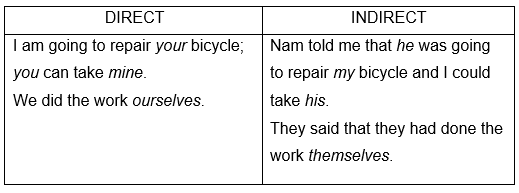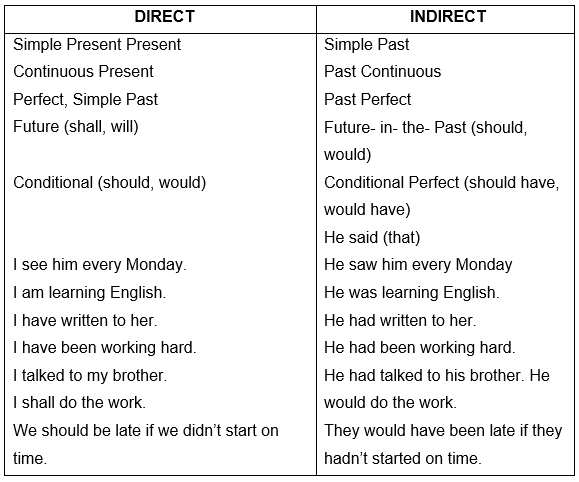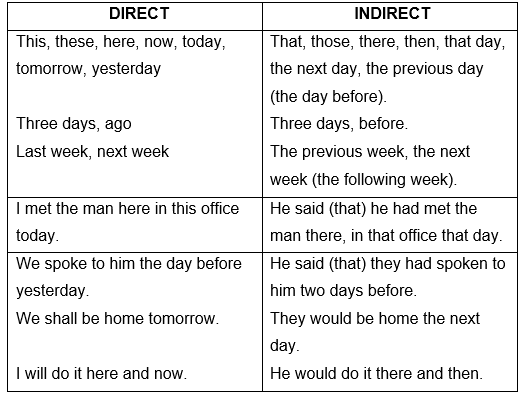LỜI NÓI GIÁN TIẾP
(Indirect Speechs)
I. GIỚI THIỆU
Khi thuật lại lời nói của người khác, ta có thể nhắc lại nguyên văn. Trường hợp này gọi là lời nói trực tiếp (Direct Speech) và khi viết phải đặt trong ngoặc kép.
Thí dụ:
Nam said, “I am going to the cinema”.
Nam nói “Tôi sẽ đi xem phim”.
The boy said to me, “My father has not come”.
Đứa bé nói với tôi “Cha tôi không về”.
Nhưng ta cũng có thể sửa đổi chút ít và lồng vào câu nói của mình. Trường hợp này gọi là lời nói gián tiếp (Indirect speech).
Thí dụ:
Nam said that he was going to the cinema.
Nam nói nó sẽ đi xem phim.
The boy told me that his father had not come.
Đứa bé nói với tôi cha nó chưa về.
II. QUI TẮC CHUYỂN LỜI NÓI TRỰC TIẾP SANG GIÁN TIẾP
Muốn chuyển một câu trần thuật từ lời nói trực tiếp sang gián tiếp cần phải chú ý những thay đổi sau đây:
1. Đổi ngôi thứ của đại từ nhân xưng, tính từ và đại từ sở hữu cho thích hợp.
Thí dụ:

2. Nếu nhắc lại lời nói trong quá khứ và dùng động từ ở thì quá khứ trong mệnh đề chính (He said…; they told…) thì động từ trong lời nói gián tiếp phải lùi về quá khứ một bước theo các theo các quy tắc và thí dụ sau đây:

Chú ý:
Qui tắc trên không áp dụng trong trường hợp:
a) Mệnh đề chính mở đầu câu ở thì hiện tại tương lai.
Thí dụ :
Trực tiếp: “I am living in Hanoi

b) Câu trực tiếp diễn tả sự thực vĩnh cửu, không thay đổi so với khi nói.
Thí dụ
Trực tiếp: “The earth moves around the sun
Gián tiếp: He said that the earth moves around the sun.
3. Thay đổi những tính từ, phó từ hay cụm phó từ chỉ nơi chốn, thời gian… cho thích hợp, theo những quy tắc và thí dụ sau đây:

Chú ý:
Trong khi luyện tập ta áp dụng tất cả các quy tắc thay đổi trên nhưng trong thực tế thì việc thay đổi phải phụ thuộc vào tình huống lúc nói.
Thí dụ:
Trực tiếp: The teacher said to Nam, “You must hand in your exercise tomorrow morning.
Gián tiếp:
a) Trường hợp người khác nhắc cho Nam việc đó ngay trong ngày hôm đó: The teacher told you that you must hand in your exercise tomorrow morning( không cần thay đổi thì và thời gian).
b) Trường hợp kể lại chuyện đó mấy hôm sau: The teacher told Nam that he had to hand in his exercise the next morning.
Bài tập
1. Chuyển những câu sau đây sang lời nói gián tiếp:
1. He said, “My son will be here soon”.
2. They said, “We have never been defeated”.
3. She told me, “I am going to the party with my mother”.
4. They said, “We have plenty of time to do our work”.
5. They declared, “We shall continue to fight till final victory”.
6. He told them at once, “The trains is gone, you are too late”.
7. He said, “This is the book you have been looking for”.
8. She said, “You can come with us if you like”.
9. The old man said, “I will take you to my house right now”.
10. He was still declaring, “You are the man who did it”.
11. The new was announced, “The hero is coming”.
12. She said, “I wrote to my sister only last week”.
13. The man declared, “I shall be doing exactly the same work next Monday as I am doing today”.
14. The foreigner told him, I am French but I have learned English at school”.
15. The boy said, “I have to go to the dentist tomorrow”.
16. We were informed, “The car is ready; we shall have to get back before the clock strikes four”.
17. The librarian said, “This book was lent to him weeks ago and he has only just returned it”.
18. The girl said, “I was bom in 1954 and I have been living in this small town since”.
19. They said, ” We have stayed here for a month, we shall go home next week”.
20. He repeated day after day, “This climate does not suit my health, I must go away as soon as I can”.
Chú ý:
Khi động từ thì quá khứ có thời gian xác định không thay đổi thì chuyên sang gián tiếp không phải đổi sang quá khử hoàn thành.
Thí dụ:
I came here on January 15, 1973.
He said that he came there on January 15, 1973.
I was at home mother arrived.
She said that she was at home when her mother arrived.
2. Chuyển những câu sau đây sang lời nói trực tiếp. Chú ý thêm dấu chấm câu và viết hoa cho đúng.
1. He said he was very sorry for the mistake he had made.
2. My father told me that I could go to the seaside this summer.
3. He said that the train would arrive in five minutes.
4. She said that she hoped it wouldn’t rain that morning.
5. He admitted that he had not worked so hard as his brother had done.
6. She promised her friend that she would write to her every week.
7. The boy said that he would be 18 on the 1st of May.
8. They said that he had deserved their thanks for all he had done.
9. The manager assured them that he had would return before they left
10. The Chairman told me he had been reading the documents all day
11. The policemen told him they would never believe what he said.
12. All who heard this said he was speaking the truth.




Comments mới nhất